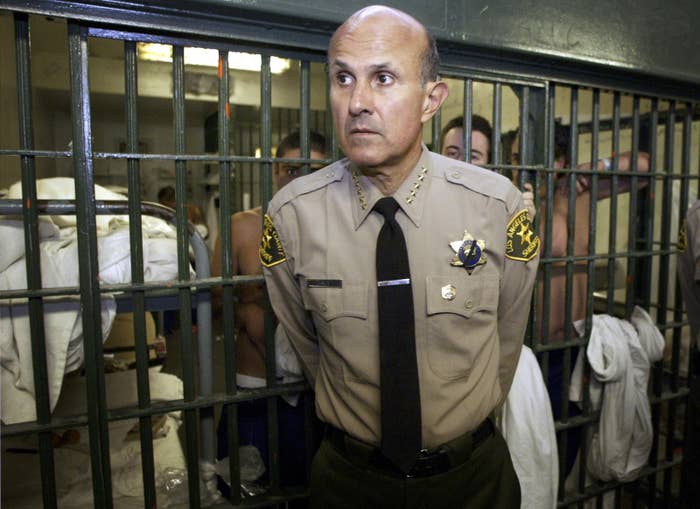
Former Los Angeles County Sheriff Lee Baca was sentenced Friday to three years in prison for his role in obstructing a federal investigation into abuses at the largest jail system in the US under his watch.
Baca, who pleaded guilty in February to lying to federal investigators, had sought probation, with his attorneys saying their 74-year-old client is in the early stages of Alzheimer's. Federal prosecutors had asked for a two-year prison term, but the federal judge went for three years.
Baca had faced a maximum of 20 years in prison.
US District Judge Percy Anderson said Baca “knew what he was doing was wrong, and he had no problem using his office to further his own agenda," according to a Department of Justice statement. “Blind obedience to a corrupt culture has serious consequences."
Anderson ordered Baca to begin serving his sentence by July 25. In addition to the prison term, Baca must also pay a $7,500 fine.
“Rather than fulfill his sworn duty to uphold the law and protect the public, Lee Baca made a decision to protect what he viewed as his empire, and then he took actions in an effort to simply protect himself," US Attorney Sandra R. Brown said in a statement. "Today’s sentence demonstrates that no one is above the law – not even the leader of the largest municipal police agency in the nation.”
Baca's case stems from a 2013 interview in which federal prosecutors say he lied to investigators when he said he didn’t know deputies were going to threaten the lead FBI agent looking into his department.

Investigators said Baca was aware his deputies were going to contact the agent in 2011, and he told them they “should do everything but put handcuffs” on her.
The operation also included sheriff's officials moving inmates they knew were being sought by the FBI to other facilities in attempt to hide them.
After Baca's first trial ended with the jury deadlocked 11 to 1 in favor of acquittal, he reached a plea agreement.
In a statement after the sentencing, his attorney, Nathan J. Hochman, said they planned to appeal the conviction and sentence, arguing key evidence was not allowed at the second trial. For example, testimony about the Alzheimer's diagnosis, which was made after the corruption scandal unfolded, was not allowed to be heard by the jury.
Hochman also highlighted Baca's 48 years of service in Los Angeles County and a legacy that includes inmate education programs, attacking the homeless problem, and community engagement initiatives.
"When the appellate court hears all the evidence in the case, something which the second jury did not, we are confident that Mr. Baca's conviction will be reversed and we will be back for a third trial," Hochman said.
Baca's fate is just the latest in a string of convictions secured by prosecutors as a result of the abuse investigation.
Ten sheriff’s officials and deputies have either been convicted or pleaded guilty for their roles in trying to obstruct the FBI's probe into physical abuse in the jail system. among them was Paul Tanaka, the sheriff department’s former second-in-command, who surrendered to the FBI after a federal grand jury indicted him on obstruction of justice charges. William “Tom” Carey, a captain who headed the sheriff's internal criminal investigations bureau, was also indicted and turned himself in to federal authorities.
Several more were found guilty in other trials of beating inmates or helping to cover up the abuse.
